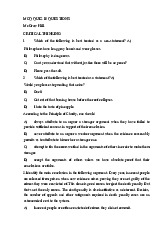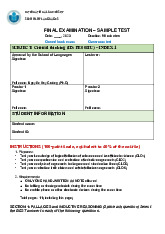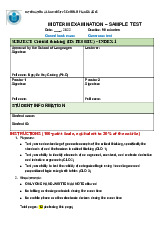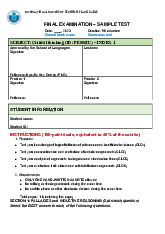
















Preview text:
07/03/2022 Introduction to Critical
© 2019 McGraw-Hill Companies. All Rights Reserved .
© 2019 McGraw-Hill Companies. All Rights Reserved. 1 07/03/2022
“Critical” here does not mean “negative”
Critical means involving or exercising skilled judgment or observation
A good critical thinker has cognitive skills and
intellectual dispositions needed to:
Effectively identify, analyze, and evaluate arguments and
Discover and overcome personal preconceptions and
Formulate and present convincing reasons in support of conclusions
Make reasonable, intelligent decisions about what to
© 2019 McGraw-Hill Companies. All Rights Reserved. 2 07/03/2022
Critical Thinking Standards, 1 Clarity •
Critical thinkers strive for clarity of language and thought Precision •
Critical thinkers understand that it is necessary to insist on
precise answers to precise questions by cutting through the confusions and uncertainties •
Example: “Is abortion wrong?” is vague. “Should abortion be
legal?” and “Is having an abortion ever moral?” are more specific questions. Accuracy •
Critical thinkers have a passion for accurate, timely information •
One can’t reason correctly with false information© 2019 McGraw-Hill
Companies. All Rights Reserved. 1-4
© 2019 McGraw-Hill Companies. All Rights Reserved.
© 2019 McGraw-Hill Companies. All Rights Reserved. 3 07/03/2022 Relevance
Irrelevance can distract people from the point but never
See Lincoln’s example on page 4 4 lOMoARcPSD|47231818 07/03/2022 Consistency
Practical inconsistency: Saying one thing and doing another
Logical inconsistency: Believing two things that can’t be simultaneously true Logical correctness
Sound reasoning or making valid inferences
derived from statements or premises
© 2019 McGraw-Hill Companies. All Rights Reserved.
© 2019 McGraw-Hill Companies. All Rights Reserved. 5 lOMoARcPSD|47231818 07/03/2022 Completeness
Thinking is better when it is deep rather than shallow,
thorough rather than superficial preconceptions
One must not dismiss something just because it’s new or
it’s contrary to something one already believes EXERCISE I.
Break into groups of four or five. Choose one member of your group
totake notes and be the group reporter. Discuss your education up to this
point. To what extent has your education prepared you to think clearly,
precisely, accurately, logically, and so forth? Have you ever known a person
(e.g., a teacher or a parent) who strongly modeled the critical thinking
standards discussed in this section? If so, how did he or she do that? II.
Have you ever been guilty of either practical inconsistency (saying
one thing and doing another) or logical inconsistency (believing inconsistent
things about a particular topic or issue)? In small groups think of examples
either from your own experience or from that of someone you know. Be
prepared to share your examples with the class as a whole.
© 2019 McGraw-Hill Companies. All Rights Reserved. 1-9
© 2019 McGraw-Hill Companies. All Rights Reserved. 6 lOMoARcPSD|47231818 07/03/2022
Focus in college is less on memorization and more
on active, intelligent evaluation of ideas and information Students learn to:
Understand the arguments and beliefs of others
Develop and defend one’s own well-supported arguments and beliefs
In college, professors will have you evaluate
beliefs/arguments of others and develop your own effectively
© 2019 McGraw-Hill Companies. All Rights Reserved.
© 2019 McGraw-Hill Companies. All Rights Reserved. 7 lOMoARcPSD|47231818 07/03/2022
Critical thinking will allow people to better perform in their jobs.
Since most job skills can be—and will be—taught “on-
site,” employers are more concerned with hiring someone who can: Solve problems Think creatively
Gather and analyze information
Draw appropriate conclusions from data
Communicate his/her ideas clearly and effectively
Benefits of Critical Thinking: In Life
Critical thinking can help us: •
Avoid making bad personal decisions •
Make informed political decisions • Attain personal enrichment •
As Socrates said, the unexamined life is not worth living •
Critical thinking, honestly and courageously pursued, can help free
us from the unexamined assumptions and biases of our upbringing and our society •
Lead self-directed, “examined” lives
© 2019 McGraw-Hill Companies. All Rights Reserved. 1-13
© 2019 McGraw-Hill Companies. All Rights Reserved. 8 lOMoARcPSD|47231818 07/03/2022
The tendency to see reality as centered on oneself Forms of egocentrism
beliefs that harmonize with one’s self-interest
Your wants and needs are not objectively more important
than anyone else's; they certainly don’t determine truth
The tendency to overrate oneself
Most people think they are above average; most people are thus wrong
Critical thinking requires one to be honest about his/her
© 2019 McGraw-Hill Companies. All Rights Reserved.
© 2019 McGraw-Hill Companies. All Rights Reserved. 9 lOMoARcPSD|47231818 07/03/2022 Group-centered thinking
Ways in which sociocentrism distorts critical thinking
The tendency to see one’s own group others
Strong feelings of loyalty to, and identification
with, one’s tribe or social group forces such as:
Groups (See Solomon Asch’s experiment)
Authority (See Stanley Milgram’s experiment)
© 2019 McGraw-Hill Companies. All Rights Reserved.
© 2019 McGraw-Hill Companies. All Rights Reserved. 10 lOMoARcPSD|47231818 07/03/2022
Barriers to Critical Thinking: Unwarranted
Assumptions and Stereotypes, 1
Assumption: Something one takes for granted or
believes to be true without any proof or conclusive evidence
Unwarranted assumption: Taking something for
granted without “good reason” •
Stereotype: Assuming that all people within a group (for
example, sex or race) share all the same qualities •
Assuming that a particular individual that belongs to a group has
certain qualities simply because he/she belongs to that group 1-18
Stereotypes are arrived at through hasty generalization, in
which one draws a conclusion about a large class of things
Being aware of an unwarranted assumption does
© 2019 McGraw-Hill Companies. All Rights Reserved.
© 2019 McGraw-Hill Companies. All Rights Reserved. 11 lOMoARcPSD|47231818 07/03/2022
Relativism is the view that there is no objective or
factual truth, but that truth varies from individual to
individual, or from culture to culture Forms of relativism
The view that what is morally right and
good for an individual, A, is what A thinks is morally right and good
A is what person A’s culture or society believes to be true
right and good for an individual, A, is whatever A’s society
or culture believes is morally right and good
© 2019 McGraw-Hill Companies. All Rights Reserved.
© 2019 McGraw-Hill Companies. All Rights Reserved. 12 lOMoARcPSD|47231818 07/03/2022
Discuss the following cases assuming that you are a cultural relativist:
Case 1: You are a member of culture C studying cultures
A and B. B loves war, A is pacifistic. Culture B invades
Notice that you can’t morally criticize B as a cultural relativist
Exercise 1.4 (Shows why Relativism Is False), 2 •
Case 2: You are a member of culture B, and B thinks that
pacifism is immoral and embraces enslaving other cultures and enslaves A •
Notice that—since you belong to B—you can’t criticize B’s moral
values (their accepting it makes it right). Also, you must think it
immoral to be a pacifist and yet must also think that the
pacifism of those in A is moral (since they approve of it). That is a contradiction.
© 2019 McGraw-Hill Companies. All Rights Reserved. 1-23
© 2019 McGraw-Hill Companies. All Rights Reserved. 13 lOMoARcPSD|47231818 07/03/2022
Case 3: Culture B consists of two subcultures: the Alphas
in B that disagrees. B invades A and forces them to
participate in their practices.
Notice that you must both accept and reject infant
sacrifice (you belong to two groups/cultures that have contradictory positions)
Makes it impossible for one to:
Criticize other cultures’ moral beliefs and values, even
Criticize one’s own societies’ prevailing moral beliefs and
Rules out the idea of moral progress
Can lead to conflicting moral duties
© 2019 McGraw-Hill Companies. All Rights Reserved.
© 2019 McGraw-Hill Companies. All Rights Reserved. 14 lOMoARcPSD|47231818 07/03/2022
More on Cultural Moral Relativism
The main reasons people are attracted to cultural
moral relativism are not good reasons at all •
The fact that it is hard to discover what is true—even if it is
impossible to discover what is true—does not mean that
there is no truth or that truth is determined by opinion/consensus •
We probably won’t be able to discover whether or not God
exists; but whether he does or not is not a matter of opinion •
Cultural moral relativism does not promote tolerance •
Suggests that if you live in an intolerant society, you are morally obligated to be intolerant 1-26 Wishful Thinking
Believing what you want to be true (without evidence
or despite evidence to the contrary)
For example, people fear the unknown and invent
comforting myths to render the universe less hostile and more predictable
• Belief in tabloid headlines
• Healing crystals and quack cures
• Communication with the dead
• “It won’t happen to me” beliefs
© 2019 McGraw-Hill Companies. All Rights Reserved. 1-27
© 2019 McGraw-Hill Companies. All Rights Reserved. 15 lOMoARcPSD|47231818 07/03/2022
Qualities of a Critical Thinker, 1
• Strives for clarity, precision, accuracy, and other
intellectual standards that characterize careful, disciplined thinking
• Sensitive to the ways in which critical thinking can
be skewed by egocentrism, wishful thinking, and
other psychological obstacles to rational belief
• Intellectually honest (admits ignorance and limits) • Listens with an open mind 1-28
© 2019 McGraw-Hill Companies. All Rights Reserved. 16 lOMoARcPSD|47231818 07/03/2022
Qualities of a Critical Thinker, 2
• Bases beliefs on facts and evidence
• Is aware of the biases and preconceptions that shape the
way he/she perceives the world • Thinks independently
• Is able to get to the heart of an issue, without being distracted by details
• Possesses intellectual courage to face and assess fairly
ideas that challenge his/her beliefs
• Pursues truth and has intellectual perseverance
© 2019 McGraw-Hill Companies. All Rights Reserved. 1-29 17




